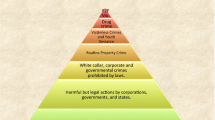Abstract
This article defends the fair-play theory of legal punishment against three objections. The first, the irrelevance objection, is the long-standing complaint that fair play fails to capture what it is about crimes that makes criminals deserving of punishment; the others are the recently raised false-equivalence and lacks-integration objections. In response, I sketch an account of fair-play theory that is grounded in a conception of the political order as a meta-cooperative practice—a conception that falls somewhere between contractual and communitarian conceptions—and draw on this account to show how the theory can overcome the objections.
Similar content being viewed by others
Notes
At the time of this writing, Boonin’s book was not yet in print. I am grateful to him for allowing me to cite from the ‘‘CUP version’ of his book as it appeared on his website (http://stripe.colorado.edu/~boonind) in February 2008.
See also Matravers (2000, p. 62): ‘fair play theory risks reducing all criminal actions to the same act: the non-mediation of one’s self-interest by the duty of fair play.’
For the purposes of this essay, I do not think it necessary to distinguish between so-called contractarian and contractualist versions of social-contract theory, as has been done in recent years.
In a reference to ‘Playing Fair with Punishment’, Montague brings me into the complaint: ‘Dagger provides no reason at all to believe that many (or any) murderers, rapists, and so on, act contrary to agreements when they commit their crimes.’ He also says, ‘Nor does [Dagger] argue that, even if some seriously harmful acts are also unfair to those who are harmed, such acts should be punished because they are unfair rather than because they are harmful’ (Montague 1995, p. 166, n. 14). My point, however, was and is that the state has the right to punish law breakers because it is the state’s responsibility to preserve the political or legal order as a cooperative enterprise. Other things equal, law breaking should be punished for its unfairness even when it is not obviously harmful.
I owe this point to Antony Duff.
As we have seen, Boonin and Montague raise much the same objection, as does Matravers (2000, p. 64).
In this way the direct response provides an answer to Matravers’ complaint that ‘in focusing [as fair-play theory does] on the restoration of some state of affairs the important retributive connection between the act of the offender and that offender’s punishment is threatened’ (Matravers 2000, pp. 60–61). As I see it, restoring the proper state of affairs—a state of fair play—requires that the offender’s act be connected to his or her punishment, at least in the sense that some offenses are more serious violations of fair play than others.
Readers more familiar with cricket than with baseball will appreciate Antony Duff’s way of stating the example: ‘if I bowl a live grenade rather than a ball at an opposing batsman, my wrongdoing is more heinous than that of someone who bowls a beamer, or who cheats—but I don’t think that that’s a matter of unfairness.’ I have borrowed this example to respond to an objection that Duff raised to the draft of this paper presented at the Stirling conference.
References
Boonin, David. 2008. The problems of punishment. Cambridge: Cambridge University Press.
Dagger, Richard. 1993. Playing fair with punishment. Ethics 103: 473–488.
Duff, Antony. 1986. Trials and punishments. Cambridge: Cambridge University Press.
Duff, Antony. 2001. Punishment, communication and community . Oxford: Oxford University Press.
Dworkin, Ronald. 1986. Law’s empire. Cambridge, MA: Harvard University Press.
Finnis, John. 1999. Retribution: Punishment’s formative aim. American Journal of Jurisprudence 44(1999): 91–103.
Hardimon, Michael. 1994. Role obligations. The Journal of Philosophy 91: 333–363.
Hart, Herbert L.A. 1970. Are there any natural rights? In Human rights, ed. A.I. Melden. Belmont, CA: Wadsworth; originally published 1955 in Philosophical Review 64: 175–191.
Hart, Herbert L.A. 1994. The concept of law, 2nd ed. Oxford: Oxford University Press.
Matravers, Matt. 2000. Justice as punishment: The rationale of coercion. Oxford: Oxford University Press.
Montague, Philip. 1995. Punishment as societal-defense. Lanham, MD: Rowman and Littlefield.
Morison, Samuel T. 2005. The politics of grace: On the moral justification of executive clemency. Buffalo Criminal Law Review 9: 1–138.
Morris, Herbert. 1968. Persons and punishment. The Monist 52: 475–501.
Murphy, Jeffrey. 1971. Three mistakes about retributivism. Analysis 31: 166–169.
Murphy, Jeffrey. 1985. Retributivism, moral education, and the liberal state. Criminal Justice Ethics 4: 3–11.
Murphy, Jeffrey. 2007. Legal moralism and retributivism revisited. Criminal Law and Philosophy 1: 5–20.
Rawls, John. 1964. Legal obligation and the duty of fair play. In Law and philosophy, ed. Sidney Hook. New York: New York University Press.
Sher, George. 1987. Desert. Princeton, NJ: Princeton University Press.
Sher, George. 1997. Deserved punishment revisited. In Approximate justice: Studies in non-ideal theory, ed. George Sher. Lanham, MD: Rowman and Littlefield.
Acknowledgments
For helpful comments on an earlier draft of this essay, I am grateful to the other participants in the Stirling Law and Philosophy Conference. I am especially grateful to Antony Duff, the assigned commentator, for his acute but sympathetic criticism.
Author information
Authors and Affiliations
Corresponding author
Rights and permissions
About this article
Cite this article
Dagger, R. Punishment as Fair Play. Res Publica 14, 259–275 (2008). https://doi.org/10.1007/s11158-008-9071-1
Published:
Issue Date:
DOI: https://doi.org/10.1007/s11158-008-9071-1



